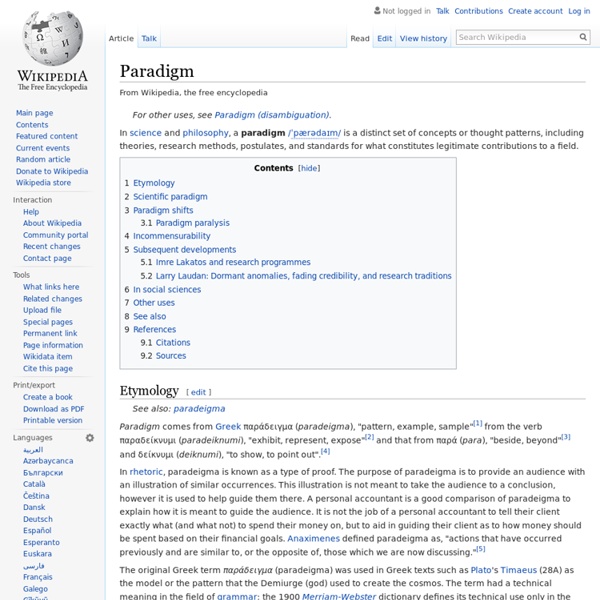Paradigm

(Pat Cryer) Qualitative versus Quantitative Research
Before getting to grips with qualitative versus quantitative research, there are a few basic ideas that need to be understood. So do read the next few sections carefully. The nature of 'truth' Research should be about discovering 'truth' - but what exactly is 'truth'? It often depends on how one looks at things - see the following box. Common idioms which illustrate how there are (at least) two sides to most viewpoints One person's terrorist is another person's freedom fighter. One person's meat is another person's poison. One person's junk is another person's antique. One person’s vice is another person's virtue. One person's security is another person's prison. One person's blessing is another person's curse. It is therefore important as a researcher to understand how you are looking at your research and to be able to explain this to others who need to know about your research. Research paradigms and frameworks Quite generally a way of looking at the world is known as a 'paradigm'. © Pat Cryer
RWJF - Qualitative Research Guidelines Project | Philosophical Tension | Common Paradigms
Qualitative and Quantitative Methods Qualitative and quantitative approaches are rooted in philosophical traditions with different epistemological and ontological assumptions. Epistemology - is the theory of knowledge and the assumptions and beliefs that we have about the nature of knowledge. How do we know the world? What is the relationship between the inquirer and the known? Ontology - concerns the philosphy of existence and the assumptions and beliefs that we hold about the nature of being and existence. Paradigms - models or frameworks that are derived from a worldview or belief system about the nature of knowledge and existence. Methodology - how we gain knowledge about the world or "an articulated, theoretically informed approach to the production of data" (Ellen, 1984, p. 9). Five Common Paradigms Most qualitative research emerges from the 'interpretivist' paradigm. Assumptions and beliefs of the Interpretivist paradigm Assumptions and beliefs of the Positivist paradigm
What is your paradigm?
Time to spend on this section: 2.5 hours Across disciplines (and within) there are varying views of what research is and how this relates to the kind of knowledge being developed. Paradigms guide how we make decisions and carry out research. According to Guba (1990), paradigms can be characterised through their: ontology (What is reality?) In order to get to grips with this, we need to clarify what these terms mean. Now you may find it useful to read the Wikipedia articles and their related links on the following key words: epistemology, methodology, ontology, paradigm, positivism, post-positivism, critical theory and constructivism before you try to answer the questions. ACTIVITY 5: How our view of what knowledge is affects the way we research. Having read about the concepts paradigm, epistemology, ontology and methodology you will begin to see how our view of the knowledge and the world affects how we plan and carry out research. Then click on the 'Feedback button' to see how you score.
Paradigm shift
A paradigm shift (or revolutionary science) is, according to Thomas Kuhn, in his influential book The Structure of Scientific Revolutions (1962), a change in the basic assumptions, or paradigms, within the ruling theory of science. It is in contrast to his idea of normal science. According to Kuhn, "A paradigm is what members of a scientific community, and they alone, share" (The Essential Tension, 1977). Kuhnian paradigm shifts[edit] Kuhn used the duck-rabbit optical illusion to demonstrate the way in which a paradigm shift could cause one to see the same information in an entirely different way. An epistemological paradigm shift was called a "scientific revolution" by epistemologist and historian of science Thomas Kuhn in his book The Structure of Scientific Revolutions. A scientific revolution occurs, according to Kuhn, when scientists encounter anomalies that cannot be explained by the universally accepted paradigm within which scientific progress has thereto been made. M.
Related:




by raviii Aug 11
-------------------------------------------------------------------------------------------------------------------------------------------------------------------
2025-08-03 19:52
by raviii Aug 3
by raviii Nov 28
Paradigm. Describes a cluster of beliefs which influences the manner in which members of a particular discipline study, in this case how research should be conducted and results reported or interpreted.
Found in Glossary: 2011 - (Jesson, et al.) Doing Your Literature Review: Traditional and Systematic Techniques by raviii Apr 16